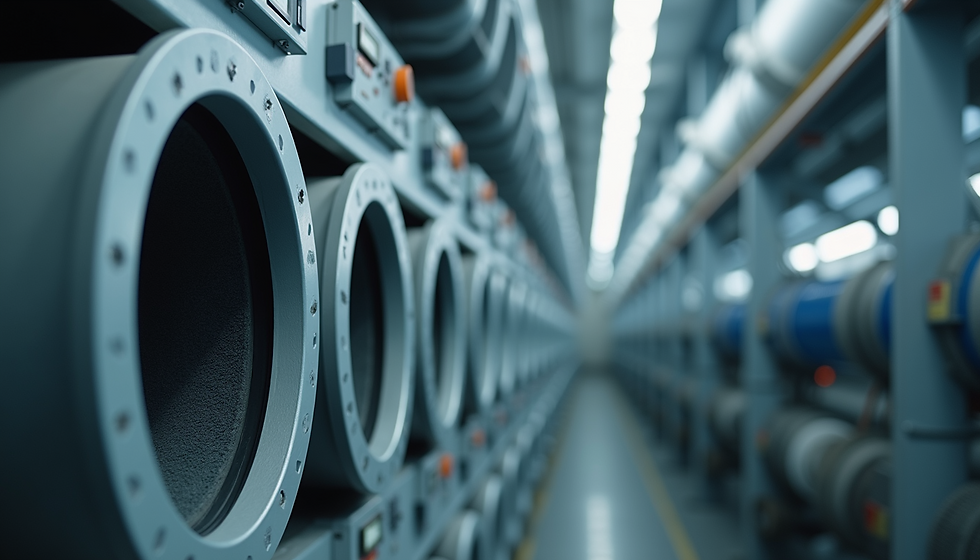Choosing the Right HEPA Filter for Your Needs
- Piyush Zarekar
- Aug 28, 2025
- 4 min read
When it comes to improving indoor air quality, selecting the right HEPA air purification filter is crucial. These filters are designed to capture tiny particles that ordinary filters might miss, making them ideal for homes, offices, and industrial settings. However, with so many options available, it can be challenging to know which filter suits your specific needs. This guide will help you understand the key factors to consider when choosing a HEPA filter, ensuring you get the best performance and value.
Understanding HEPA Air Purification Filter Technology
HEPA stands for High Efficiency Particulate Air. These filters are engineered to trap at least 99.97% of particles as small as 0.3 microns. This includes dust, pollen, pet dander, smoke, and even some bacteria and viruses. The effectiveness of a HEPA filter depends on its design, material, and how it is maintained.
There are different classes of HEPA filters, such as H10 to H14, with H14 being the most efficient. When choosing a filter, consider the particle size you want to target and the environment where it will be used. For example, an H13 or H14 filter is recommended for medical or laboratory settings, while a lower grade might suffice for general home use.
Key features to look for in a HEPA filter:
Filter efficiency rating (H10 to H14)
Filter size and compatibility with your air purifier or HVAC system
Airflow resistance to ensure your system can handle the filter without losing performance
Durability and lifespan to reduce replacement frequency

Close-up view of a HEPA filter showing its fibrous material
How to Choose the Best HEPA Air Purification Filter for Your Space
Choosing the right HEPA filter depends on several factors related to your space and air quality goals. Here are some practical steps to guide your decision:
Assess Your Air Quality Needs
Identify the main pollutants you want to remove. For allergy sufferers, filters that capture pollen and pet dander are essential. For smokers or those exposed to wildfire smoke, filters that trap fine smoke particles are necessary.
Check Filter Compatibility
Ensure the filter fits your air purifier or HVAC system. Using the wrong size can reduce efficiency and damage your device.
Consider Airflow and Noise Levels
Some HEPA filters create more resistance, which can reduce airflow and increase noise. Look for filters designed to balance filtration and airflow.
Evaluate Maintenance and Cost
Filters need regular replacement. Choose one with a reasonable lifespan and cost to maintain long-term air quality without breaking the bank.
Look for Certifications
Certified filters meet strict standards for performance. Look for labels from recognized organizations to ensure quality.
By following these steps, you can select a filter that fits your environment and budget while providing clean, healthy air.

Eye-level view of an air purifier with a HEPA filter installed
Where is the HEPA Filter Used?
HEPA filters are versatile and used in many settings to improve air quality. Understanding where they are commonly applied can help you decide which type suits your needs best.
Residential Use: Many homes use HEPA filters in air purifiers to reduce allergens, dust, and pet dander. They are especially beneficial in bedrooms and living rooms.
Healthcare Facilities: Hospitals and clinics use high-grade HEPA filters to maintain sterile environments and prevent the spread of airborne infections.
Industrial Settings: Factories and laboratories use HEPA filters to capture hazardous particles, fumes, and dust, protecting workers and equipment.
Commercial Buildings: Offices and public spaces install HEPA filters in HVAC systems to improve overall air quality and reduce sick building syndrome.
Transportation: Some airplanes and trains use HEPA filters to ensure clean air for passengers during travel.
Knowing the typical applications can help you choose a filter designed for your specific environment, whether it’s a home, workplace, or industrial site.

High angle view of a hospital room with air filtration system
Benefits of Using a High Efficiency Particulate Air Filter
Using a high efficiency particulate air filter offers numerous advantages beyond just cleaner air. Here are some key benefits:
Improved Health: Removing allergens and pollutants reduces respiratory issues, allergies, and asthma symptoms.
Enhanced Comfort: Cleaner air means less dust buildup and fresher indoor environments.
Protection Against Airborne Diseases: HEPA filters can trap bacteria and viruses, reducing the risk of infections.
Better Sleep Quality: Cleaner air promotes better breathing and restful sleep.
Increased Equipment Longevity: In industrial settings, HEPA filters protect machinery from dust and contaminants, reducing maintenance costs.
These benefits make investing in a quality HEPA filter worthwhile for both personal and professional spaces.
Tips for Maintaining Your HEPA Filter for Optimal Performance
To get the most out of your HEPA filter, proper maintenance is essential. Here are some actionable tips:
Regular Replacement: Follow the manufacturer’s guidelines for filter replacement. A clogged filter reduces efficiency and airflow.
Pre-filter Cleaning: Some systems have pre-filters that capture larger particles. Clean or replace these regularly to extend the HEPA filter’s life.
Monitor Air Quality: Use air quality monitors to track indoor pollution levels and adjust filter usage accordingly.
Keep Surroundings Clean: Regular dusting and vacuuming reduce the load on your HEPA filter.
Check for Air Leaks: Ensure your air purifier or HVAC system is sealed properly to prevent unfiltered air from bypassing the filter.
By maintaining your filter well, you ensure consistent air purification and prolong the life of your device.
Choosing the right HEPA air purification filter is a smart investment in your health and comfort. By understanding the technology, assessing your needs, and maintaining your filter properly, you can enjoy cleaner, fresher air every day. Whether for home, work, or industrial use, the right HEPA filter makes all the difference.









Comments